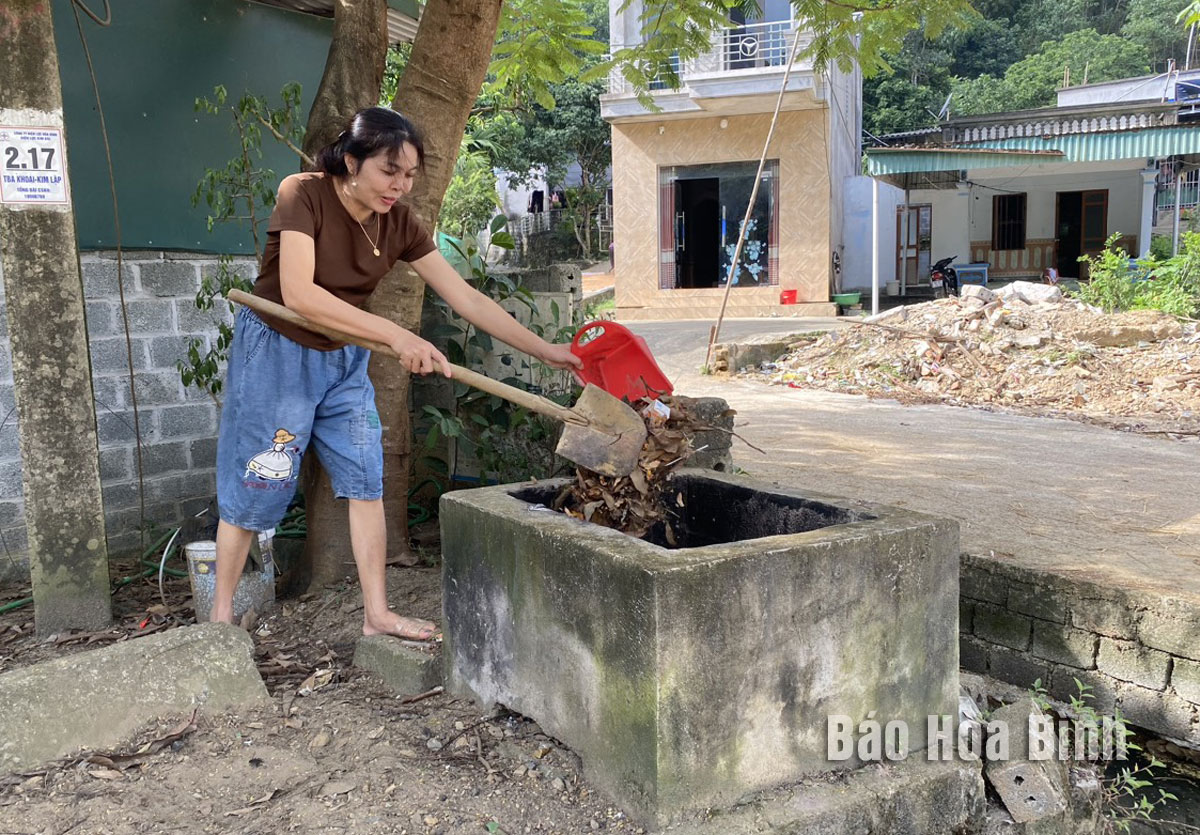
(HBO) - Currently, the implementation of the environment-related criteria in the new-style rural area building programme, particularly rural waste treatment, has received due attention. As building centralised waste treatment areas is not yet possible, building mini brick incinerators at households is a useful model that is proving effective.

A woman in Mo hamlet, Kim Lap commune (Kim Boi), collects and treats garbage at a mini incinerator, contributing to reducing environmental pollution.
Previously, due to living habits, most of the waste of households in Kim Lap commune (Kim Boi) was not treated but mainly thrown into ditches and on streets, causing environmental pollution and adversely affecting people's health. To solve this problem, in 2020, the Kim Lap Farmers' Association disseminated and encouraged locals to build mini trash incinerators at households to collect, process, and limit waste generated into the environment.
Muon is one of the hamlets with the most mini waste incinerators (150). Villagers now no longer see piles of garbage on the roads in the locality. In addition, families are also aware that protecting the environment is a shared responsibility of each person as well as the whole society, so they classify their own waste. Dry garbage is burned in mini incinerators, while fresh garbage that cannot be burned is buried in gardens.
Bui Thi Luc in Muon hamlet shared: "When there was no trash incinerator, every day when I came home from the market, I often threw plastic bags into the garden. Although the family also dug a hole to bury trash in the garden, household waste could not be thoroughly treated. Since the mini waste incinerator was built, there is no longer a situation of littering, the house is clean, the ash from burned garbage and by-products from vegetables and fruits used to compost as fertiliser for plants.”
The building of mini incinerators is simple, easy to implement, and does not take up space, and it can treat household waste on-site, thus helping locals develop a habit of classifying and treating waste on site. In addition, the amount of emissions when burning does not spread to residential areas, so it receives positive response of a large number of people. To date, Kim Lap commune has over 400 brick incinerators built in households, which have initially showed good efficiency of basically solving the amount of waste at home, gradually forming the habit of maintaining hygiene and addressing environmental pollution.
The Standing Board of the Hoa Binh provincial Party Committee has agreed in principle on a proposal by the Standing Board of the Party Committee of Hoa Binh city to gather feedback on the city’s 1:2000 zoning plan, which forms part of its broader urban development strategy.
Hoa Binh province has made notable progress in public administration reform and digital government development, with the satisfaction index among citizens and businesses reaching over 84%, according to recent government evaluations.
Thanks to great efforts by local authorities in recent times, the governance and public administration performance of Mai Chau district has been significantly improved.
In the afternoon of June 6, the Party Committee, the People's Council, the People's Committee and the Fatherland Front of Lac Son district solemnly held a meeting to celebrate the 139th anniversary of the district's founding (1886–2025) and the 79th anniversary of the establishment of the district's Party Committee (1946–2025). There was the attendance of Mr. Bui Van Thang, the Vice Chairman of the Provincial People's Council; Mr. Quach Tat Liem, the Vice Chairman of the Provincial People's Committee; Ms. Dang Bich Ngoc, the Deputy Head of the National Assembly Delegation of the province; as well as the former leaders of the province and district through various periods, who are the natives of the district.
Implementing the Politburo’s Resolution No. 57-NQ/TW on breakthroughs in science – technology, innovation, and digital transformation is a golden opportunity for the northern mountainous province of Hoa Binh to renew growth model, improve competitive edge and shorten digital gap.
Resolution 57-NQ/TW, issued by the Politburo on December 22, 2024, identifies sci-tech, innovation, and digital transformation as strategic breakthroughs to build a developed and prosperous nation. In Hoa Binh province, this spirit is not just a slogan, it’s being put into action through concrete initiatives that form a "new development triangle”: digital citizenship, digital economy, and digital administration.



